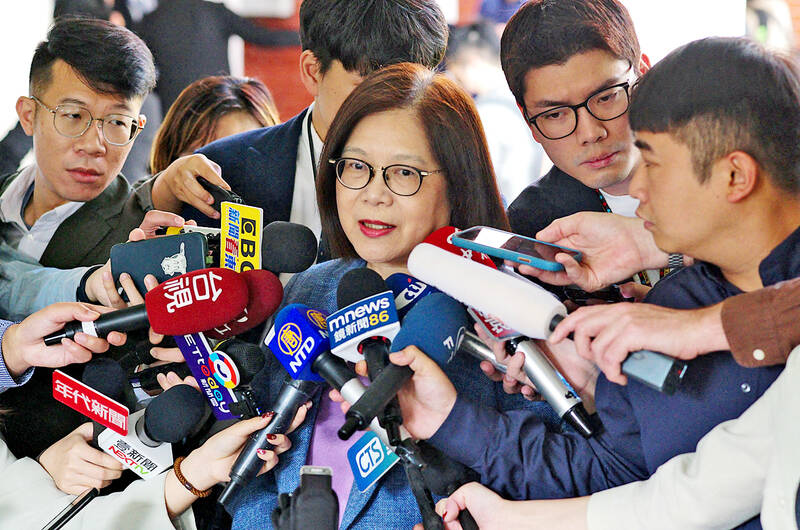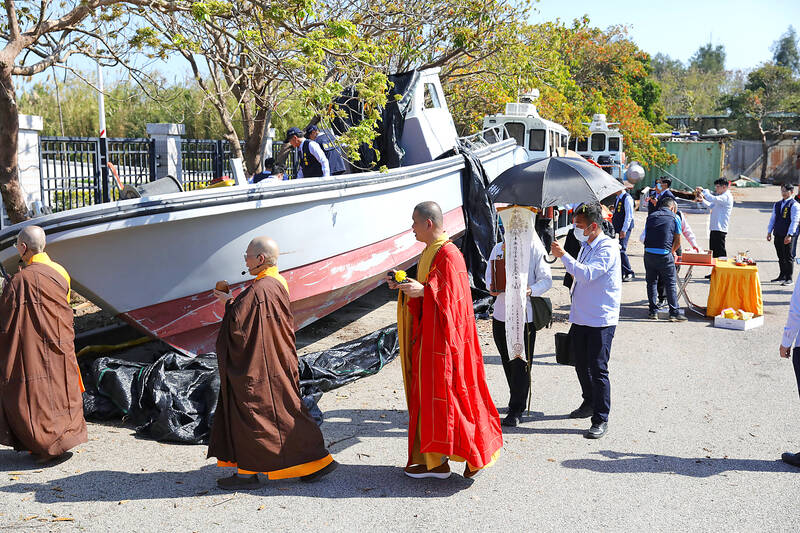Premier Chen Chien-jen (陳建仁) yesterday called for both sides of the Taiwan Strait to approach the security of Kinmen and Xiamen waters with rationality and equitability, following a boat chase that resulted in the death of two Chinese fishers last week.
Chen was responding to media inquiries ahead of a legislative session amid rising cross-strait tensions following the capsizing of a Chinese speedboat off the east coast of Kinmen on Wednesday last week during a pursuit by the Taiwanese coast guard.
The Ministry of National Defense established the boundaries of “prohibited” and “restricted” waters around Kinmen in 1992 to better protect fishers, with relevant law enforcement well understood by both sides, Chen said.

Photo: Sam Yeh, AFP
The government will continue to uphold maritime safety and fishers’ rights, Chen said, urging both parties to prohibit the entry of illegal vessels into these waters through their respective coast guards.
He added that Taiwan has been implementing law and order in compliance with the Act Governing Relations Between the People of the Taiwan Area and the Mainland Area (臺灣地區與大陸地區人民關係條例) in the waters surrounding Kinmen County, less than 10km from China’s Xiamen.
Minister of National Defense Chiu Kuo-cheng (邱國正) yesterday told reporters that such affairs fall under the jurisdiction of the coast guard, and the military would not intervene to prevent matters from escalating.

Photo: CNA
The prohibited zone around the main islands of Kinmen and Little Kinmen, or Lieyu (烈嶼), extends about halfway to the Chinese coast to the north and northeast, up to about 4km to the east and about 8km to the south.
Taipei and Beijing have traded barbs over the legitimacy of the zone after the incident, with the latter announcing that it would enhance its maritime law enforcement capabilities and increase regular patrols in the region.
On Monday, the China Coast Guard boarded a Kinmen sightseeing boat to conduct a surprise inspection.
Ocean Affairs Council Minister Kuan Bi-ling (管碧玲) yesterday called China’s action regrettable and urged Taiwanese ship operators “not to stay where China is attempting inspections, but instead notify the council immediately for assistance.”
At about 9am yesterday, China’s Marine Surveillance No. 8209 ship was intercepted by a coast guard vessel after radar detected it entering restricted waters near Kinmen.
The coast guard told the Chinese ship that it was barred from entering restricted waters without authorization and shadowed it for nearly an hour before it left Kinmen waters.
Meanwhile, family members of the two Chinese men who died in the incident arrived in Kinmen yesterday to hold funeral rituals, while the other two men on the boat were deported back to China.
Although Chinese authorities refused to sign the formal repatriation form, the coast guard said it was a formality and the two men would be sent back regardless.
The six relatives of the deceased, accompanied by a lawyer and officials from the Red Cross and China’s Association for Relations Across the Taiwan Straits, arrived by boat at Shueitou Pier (水頭碼頭) at about 10:30am.
Li Zhaohui (李朝暉), an adviser for the Jinjiang branch of the Chinese Red Cross, told reporters the relatives’ “most basic demand” was to understand how the men had died.
The group first traveled to the Kinmen County Funeral Parlor, where the bodies are being held, before conducting a “spirit summoning” (引魂) ceremony for them at Fuguodun Pier (復國墩碼頭).
From there, they were to go back to the funeral parlor to hold a prayer service before the bodies were cremated, and would return to China after retrieving their funeral urns this morning, said sources with knowledge of the matter who wished to remain anonymous.
Tamkang University Graduate Institute of China Studies associate professor Chang Wu-yueh (張五岳) yesterday said that the Kinmen incident should not escalate cross-strait tensions.
Broadly speaking, neither side has attempted to worsen cross-strait relations over the issue, he said.
In terms of geopolitics, Kinmen has a particular understanding of China due to its proximity, Chang said.
The establishment of pilot areas for encouraging joint interaction for cross-strait development in Xiamen and Kinmen would also mean that the incident would cease to influence cross-strait affairs, he added.
Additional reporting by Chiu Chun-fu and CNA

‘CORRECT IDENTIFICATION’: Beginning in May, Taiwanese married to Japanese can register their home country as Taiwan in their spouse’s family record, ‘Nikkei Asia’ said The government yesterday thanked Japan for revising rules that would allow Taiwanese nationals married to Japanese citizens to list their home country as “Taiwan” in the official family record database. At present, Taiwanese have to select “China.” Minister of Foreign Affairs Lin Chia-lung (林佳龍) said the new rule, set to be implemented in May, would now “correctly” identify Taiwanese in Japan and help protect their rights, the Ministry of Foreign Affairs said in a statement. The statement was released after Nikkei Asia reported the new policy earlier yesterday. The name and nationality of a non-Japanese person marrying a Japanese national is added to the

AT RISK: The council reiterated that people should seriously consider the necessity of visiting China, after Beijing passed 22 guidelines to punish ‘die-hard’ separatists The Mainland Affairs Council (MAC) has since Jan. 1 last year received 65 petitions regarding Taiwanese who were interrogated or detained in China, MAC Minister Chiu Chui-cheng (邱垂正) said yesterday. Fifty-two either went missing or had their personal freedoms restricted, with some put in criminal detention, while 13 were interrogated and temporarily detained, he said in a radio interview. On June 21 last year, China announced 22 guidelines to punish “die-hard Taiwanese independence separatists,” allowing Chinese courts to try people in absentia. The guidelines are uncivilized and inhumane, allowing Beijing to seize assets and issue the death penalty, with no regard for potential

‘UNITED FRONT’ FRONTS: Barring contact with Huaqiao and Jinan universities is needed to stop China targeting Taiwanese students, the education minister said Taiwan has blacklisted two Chinese universities from conducting academic exchange programs in the nation after reports that the institutes are arms of Beijing’s United Front Work Department, Minister of Education Cheng Ying-yao (鄭英耀) said in an exclusive interview with the Chinese-language Liberty Times (the Taipei Times’ sister paper) published yesterday. China’s Huaqiao University in Xiamen and Quanzhou, as well as Jinan University in Guangzhou, which have 600 and 1,500 Taiwanese on their rolls respectively, are under direct control of the Chinese government’s political warfare branch, Cheng said, citing reports by national security officials. A comprehensive ban on Taiwanese institutions collaborating or

STILL COMMITTED: The US opposes any forced change to the ‘status quo’ in the Strait, but also does not seek conflict, US Secretary of State Marco Rubio said US President Donald Trump’s administration released US$5.3 billion in previously frozen foreign aid, including US$870 million in security exemptions for programs in Taiwan, a list of exemptions reviewed by Reuters showed. Trump ordered a 90-day pause on foreign aid shortly after taking office on Jan. 20, halting funding for everything from programs that fight starvation and deadly diseases to providing shelters for millions of displaced people across the globe. US Secretary of State Marco Rubio, who has said that all foreign assistance must align with Trump’s “America First” priorities, issued waivers late last month on military aid to Israel and Egypt, the